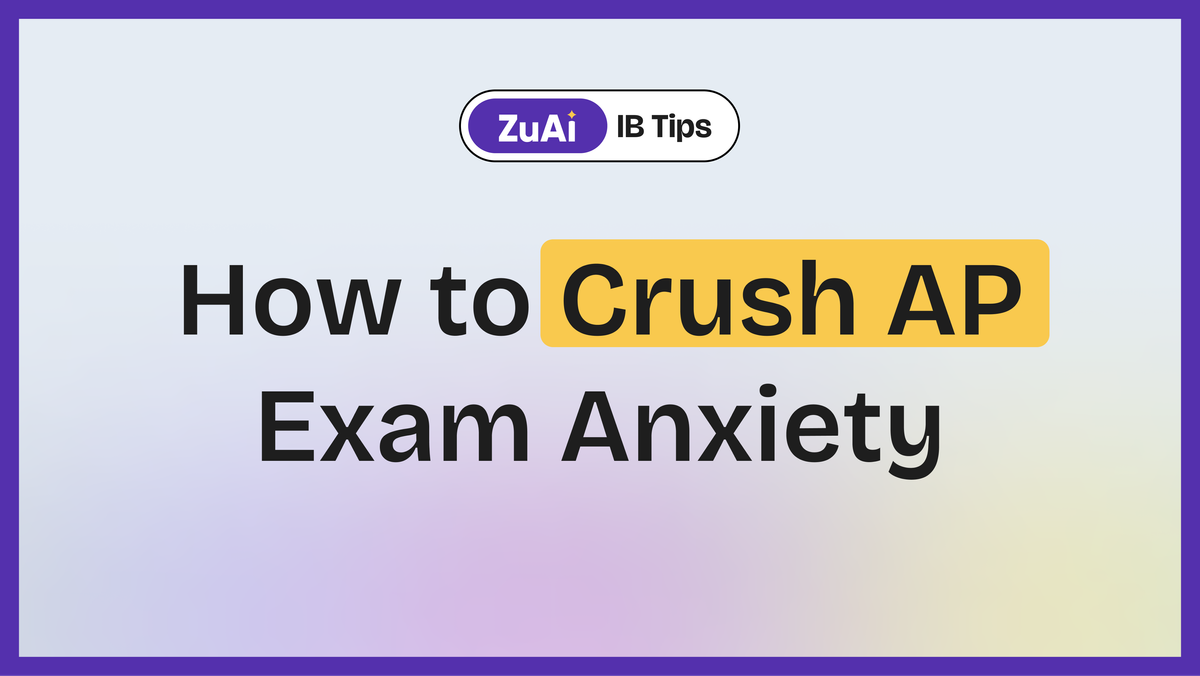How to Crush AP Exam Anxiety: A Guide to Staying Calm and Focused

Author: Michelle Reed, AP Student Coach & Wellness Advocate
AP exams can be stressful, and it’s normal to feel overwhelmed as exam day approaches. However, managing your anxiety is just as important as studying. Staying calm and focused during preparation and on test day can significantly improve your performance. In this guide, you’ll learn strategies to reduce stress, boost confidence, and tackle your AP exams with ease.
How to Crush AP Exam Anxiety: A Guide to Staying Calm and Focused
Why Do AP Exams Cause Anxiety?
AP exams are high-stakes tests that can impact your college admissions and even your financial future. With so much riding on them, it’s no surprise that many students feel anxious. However, understanding the root of your stress can help you manage it effectively.
Common Causes of AP Exam Anxiety:
- Fear of failure or underperformance
- Lack of preparation or procrastination
- Pressure from parents, teachers, or peers
- Uncertainty about the exam format or content
The good news? These stressors can be tackled with the right strategies.
Strategies to Reduce AP Exam Anxiety
the
1. Start Early and Create a Study Plan
Anxiety often stems from feeling unprepared. By starting your preparation early, you can reduce last-minute stress and build confidence.
How to Create a Study Plan:
- Break down the syllabus into weekly chunks.
- Set achievable goals for each subject.
- Include review time for past papers and mock exams.
2. Practice Mindfulness and Relaxation Techniques
Incorporating mindfulness into your routine can help you stay calm during both preparation and the exam itself. Deep breathing, meditation, and visualization are excellent tools to reduce stress.
Quick Relaxation Techniques:
- Deep Breathing: Inhale for four counts, hold for four, and exhale for six.
- Visualization: Picture yourself confidently answering questions and succeeding.
Apps like Calm or Headspace can guide you through mindfulness exercises tailored to students.
3. Simulate Exam Conditions
One way to reduce test-day nerves is by practicing under real exam conditions. Timed practice tests not only prepare you for the format but also help you manage time and pressure.
Pro Tip: Take full-length mock exams at the same time of day as your actual test. This helps your body and mind adapt to the schedule.
4. Stay Active and Eat Well
Physical health and mental well-being go hand in hand. Regular exercise, balanced meals, and proper hydration can improve your focus and reduce stress.
Tips for Exam Week:
- Eat brain-boosting foods like nuts, berries, and leafy greens.
- Stay hydrated with water or herbal teas.
- Avoid caffeine or sugary snacks that can cause energy crashes.
5. Focus on What You Can Control
Worrying about the outcome won’t change it, but focusing on what you can control will empower you. Shift your mindset to what’s within your reach:
- Your preparation
- Your effort
- Your attitude
When negative thoughts arise, challenge them by reminding yourself of your hard work and progress.
Test-Day Tips to Stay Calm
Even with thorough preparation, test-day anxiety can creep in. Use these strategies to stay focused and composed.
1. Arrive Early and Be Prepared
Avoid unnecessary stress by arriving early with everything you need:
- Admission ticket
- Photo ID
- Approved calculator (if needed)
- Pencils and erasers
2. Start with a Relaxation Exercise
Before the exam begins, take a moment to ground yourself. A quick breathing exercise or a positive affirmation can help calm pre-test jitters.
Affirmation Example: “I am prepared and capable. I will do my best.”
3. Tackle Questions Strategically
If you’re stuck on a question, don’t panic. Move on and return to it later. Use the process of elimination to improve your chances of getting it right.
Pro Tip: Answer the easiest questions first to build momentum and confidence.
Bonus Tip: AI app for IB Exams = ZuAI
It's the ultimate AI app designed to help your child excel in their IB exams. As a parent, you want the best for your child, and so do we.
ZuAI provides personalized study support, practice questions, and detailed explanations tailored specifically to the IB curriculum.
Think of it as a smart tutor who understands your child’s unique learning needs, helping them tackle challenging subjects with confidence.
With ZuAI, you can feel reassured knowing your child is getting the extra help they need to succeed and build a bright future.
We genuinely care about your child's success and are here to support them every step of the way.

Looking for free solutions to previous year's question papers? Check out ZuAI's YouTube channel.
FAQ Section
Q1: What if I freeze during the AP exam?
Take a deep breath and refocus. Start with a question you know well to regain your confidence. Remember, you don’t need a perfect score to perform well.
Q2: How can I avoid procrastination while studying?
Break your tasks into smaller, manageable goals. Use a timer (e.g., Pomodoro Technique) to stay focused, and reward yourself after completing each session.
Q3: What should I do the night before the exam?
Review your notes lightly, but don’t overdo it. Get a good night’s sleep and prepare your materials in advance to avoid last-minute stress.
Q4: How do I calm my nerves right before the test starts?
Try deep breathing, a grounding technique (e.g., feeling your feet on the floor), or a quick pep talk to yourself. Visualize your success to boost confidence.
Conclusion
AP exams can be challenging, but managing your anxiety is just as important as mastering the material. By starting early, practicing mindfulness, and focusing on what you can control, you can reduce stress and perform your best. Remember, preparation and a positive mindset are your greatest tools for success.
Good luck on your AP exams—you’ve got this!
